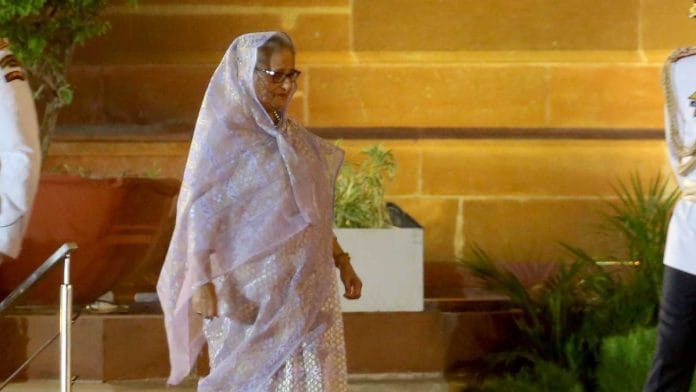New Delhi: In a first, Bangladesh’s International Crimes Tribunal (ICT) has formally indicted former Prime Minister Sheikh Hasina on charges of crimes against humanity.
The charges stem from the then Hasina-led Awami League government’s response to widespread anti-government demonstrations in July and August 2024, which ultimately led to Hasina’s ouster on 5 August.
The tribunal has accused Hasina of ordering mass killings, torture, and enforced disappearances during the seven-week uprising.
According to a United Nations report, as many as 1,400 protesters, 12-13 percent of them children, were killed during the crackdown on protesters in Bangladesh between 1 July and 5 August 2024.
Hasina has been in exile in India since. In December 2024, the Muhammad Yunus-led interim administration in Bangladesh sent a diplomatic note to India, requesting her extradition. India’s Ministry of External Affairs confirmed the note but has not responded so far.
Last month, the ICT formally charged Hasina with crimes against humanity in another case, accusing her of “ordering the extermination of protesters,” among other charges.
On 1 June, the charges became public during a live tribunal session. ICT even ordered Bangladeshi authorities to present her before a court on 16 June.
The tribunal has also indicted Bangladesh’s former home minister Asaduzzaman Khan and former police chief Chowdhury Abdullah Al Mamun for their roles in the violent crackdown on protesters last year.
Of the three accused, only Mamun is currently in custody.
Bangladeshi media reports indicate Mamun has confessed and requested to turn state witness. The trial is set to begin in absentia on 3 August.
The interim administration’s press secretary Shafiqul Alam issued a statement Wednesday, asking India to “act with conscience and moral clarity” regarding the extradition. The statement followed a BBC Bangla report revealing a leaked phone conversation in which Hasina allegedly ordered security forces to “shoot” student protesters during the uprising.
Awami League in a statement on X condemned the indictment calling it ‘state sponsored persecution’.
“We condemn in strongest terms the indictment against our party president and other leaders as we assert that this step marks another testament to the ongoing witch hunt against our party and weaponisation of the judiciary by the Yunus regime … By resorting to this kangaroo court, Yunus regime has denied July August victims of justice and legitimized abuse of judiciary to decimate opposition let alone stoke ongoing pogrom including extrajudicial killings of citizens for their affiliation with Awami League—all repressive steps that violates universal human rights. While we reiterate our commitment for a fair trial for July august victims, we repeatedly express no confidence on the current trial process,” the statement read.
We Strongly Condemn the Weaponization of Judiciary and State-Sponsored Persecution Under the Yunus Regime
—
We condemn in strongest term the indictment against our party president and other leaders as we assert that this step marks another testament to the ongoing witch hunt…
— Bangladesh Awami League (@albd1971) July 10, 2025
The ICT is a reconstituted domestic war crimes tribunal established by the Hasina government in 2010, primarily to prosecute individuals accused of collaborating with Pakistan during the 1971 war.
It is currently dealing with 27 cases lodged in connection with crimes against humanity committed during the July 2024 student-led uprising, with Hasina and 205 others named as the accused, and 73 arrested so far. As many as 132 accused remain at large. One died in custody.
So far, only three of these cases, including the contempt of court case against Hasina, have moved to the trial stage, whereas the other 24 are in the preliminary investigation stage. Named in four cases, Hasina now faces jail in the case of contempt of court.
She also faces formal charges in another case that accuses her of inciting violence through provocative speeches; ordering the extermination of protesters using helicopters, drones, and lethal weapons; responsibility for the brutal murder of Begum Rokeya University student Abu Sayeed; and responsibility for the deaths of six protesters at Chankharpul.
(Edited by Amrtansh Arora)
Also Read: Protests rock Bangladesh after video of Hindu woman’s rape goes viral, local BNP politician held






